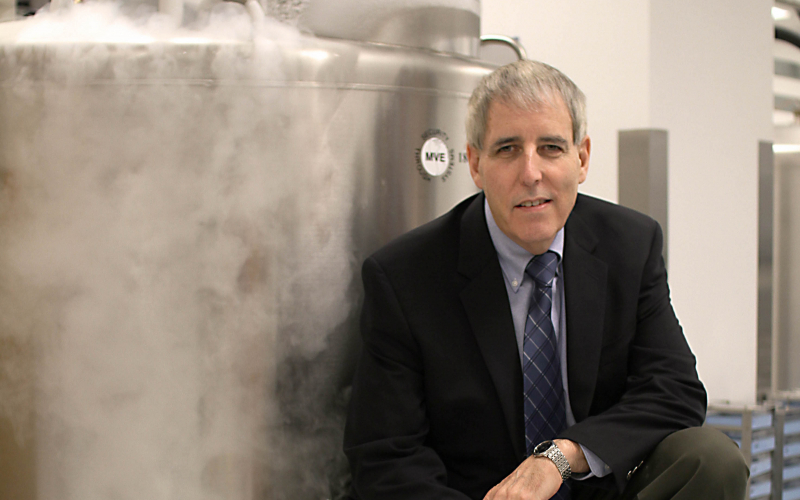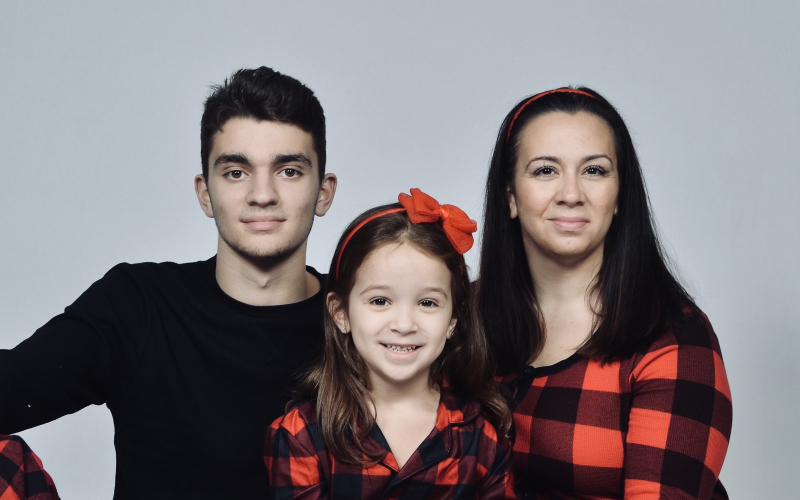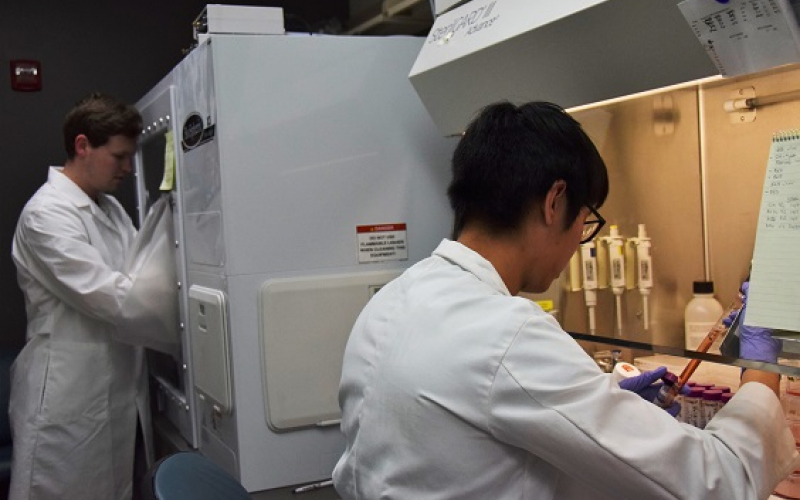By: Adam Paris
When Lilly faced surgery after relapsing, her family made the decision to donate extra tumor tissue to research instead of throwing it away.
“We hope that Lilly’s neuroblastoma tumor can be some small part of helping other children who are waiting for cures,” said Nicole Ibbotson, Lilly’s mom.
Tissue donation is a critical but often overlooked piece of childhood cancer research. As childhood cancer researchers work to find the drugs that could be cures, they are facing a critical shortage of tissue samples to test drugs for effectiveness and safety in the lab. This shortage slows the pace of research and ultimately delays cures for children.
However, families and health care professionals can help accelerate research through tissue sample donation.
Tissue samples like Lilly’s are sent to The Childhood Cancer Cell Repository, a lab funded by Alex’s Lemonade Stand Foundation (ALSF) and used as a resource lab by the Children’s Oncology Group (COG). The Repository is located at Texas Tech University Health Sciences Center in Lubbock and directed by Dr. Patrick Reynolds. Over his decades studying cancer tissue and cell lines, Dr. Reynolds knows how critical tissue donation is to the process of translating research in the lab to the clinic, where children battling cancer are waiting for cures.
Dr. Reynolds believes the Repository can help accelerate research by establishing cell lines that are grown in the lab in conditions as close to those in a child as possible. The laboratory also grows the cancers directly in special mice as opposed to test tubes. Those cancer models are called patient-derived xenografts (PDXs). The cell lines and PDXs are expanded, banked in the Repository and then sent to researchers across the globe.
Dr. Reynolds started the research as a junior faculty member at UCLA. He still recalls a colleague wondering whether creating additional cell lines was even worthwhile.
“He asked, ‘Why would you do that Pat? You’ve already got six!’” said Dr. Reynolds.
Cell lines and PDXs are a renewable resource, meaning if one sample can grow, infinite copies can be made and provided to many laboratories. In a field like childhood cancer, where the number of subtypes continue to increase, having an ample supply of cell lines is imperative. As of February 2020, The Childhood Cancer Repository has sent 2910 samples to 484 laboratories in 28 countries. The Repository currently has 568 cell lines and 105 xenografts.
“If we’re going to make advances in understanding how cancers resist current treatment and identify new drugs that work against such cancers, we need to have a large number of models,” said Dr. Reynolds. “What works in 10 percent of people may not work in the other 90 percent.”
The other 90 percent is who Dr. Reynolds hopes to help, and it wouldn’t be possible without the generosity of children and their families providing samples. The Repository’s process starts by doctors sending samples of tumor, blood or bone marrow with tumor cells from a child either still fighting or recently passed from cancer.
Then, Dr. Reynolds tries to grow the cell in laboratory conditions that mimic the child’s body as closely as possible. If they’re successful, they can grow unlimited numbers of the cell line or PDX model. One primary advantage to PDXs are that because they are grown in an environment that more closely mimics the human body, the PDXs better represent the unique genetic makeup of a tumor. Experiments can be done on cell lines or mice with a PDX that cannot be done in children, allowing researchers to identify novel targets or biomarkers within cancer cells. In turn, they can test novel treatments against these cancers, hopefully leading to more precise therapies that only affect the target rather than the child’s whole body.
Whenever possible, Dr. Reynolds develops both a cell culture and matching PDX. Between the two, he is positioning the Repository as a timeless resource.
“Having all of these samples in one place and not having to charge researchers is a huge advantage, made possible by the generous support from ALSF,” said Dr. Reynolds. “The invaluable thing is that these are a renewable resource. What we establish today will still be used 50 years from now.”
Despite the extensive groundwork Dr. Reynolds has laid, most of his samples are from neuroblastoma. The volume has, with the help of collaborators like ALSF Scientific Advisory Board President Dr. John Maris, helped lead to novel research efforts, including breaking down the genomics of every neuroblastoma sample.
“ALSF supported sequencing on a large number of PDXs for neuroblastoma to support work by the NCI Pediatric Preclinical Testing Consortium, and basically, all of the samples were from the Repository,” said Dr. Reynolds. “People look at that and say they want to do something similar for another cancer type, but we just don’t have the other models.”
Importantly, all those PDXs and the associated data are available via the Repository to the entire research community. Dr. Reynolds has seen the benefits of establishing and banking cell lines and PDXs from one childhood cancer type can have, so what could a bank of samples from all types mean?
“We believe that the many novel discoveries that have come from the large collection of neuroblastoma models are great examples of what the Repository can do to facilitate childhood cancer research. This was all possible because of the enthusiasm and participation in this effort by many pediatric oncologists who take care of neuroblastoma patients across North America. We look forward to doing the same with all types of childhood cancer," said Dr. Reynolds.
In the immediate future, Dr. Reynolds remains intent on advancing the number of cell lines and PDXs available to researchers for free. He’s grateful to continue the work, knowing how close it was to disappearing.
“This Repository wouldn’t exist if it were not for Alex’s Lemonade Stand Foundation,” said Dr. Reynolds. “It allowed me to do this without fear of being unable to continue giving these out freely to researchers.”
Dr. Reynolds believes in quality and quantity at the Repository, knowing that continued growth could lead to critical breakthroughs for kids fighting cancer.
As for the colleague who told Dr. Reynolds six samples was plenty: “He’s already requested dozens of cell lines and PDXs from us.”
You can volunteer to donate tissue samples to The Childhood Cancer Repository, including tumor cells, bone marrow and blood, at any point during your child’s cancer treatment — biopsy, surgery or routine testing. These samples are stored at the Repository and used to create cell lines — a renewable resource that researchers around the world can request and use to test potential drugs. Ready to learn more? Read about The Childhood Cancer Repository and request The Childhood Cancer Repository information sheet to share with your physician here.




